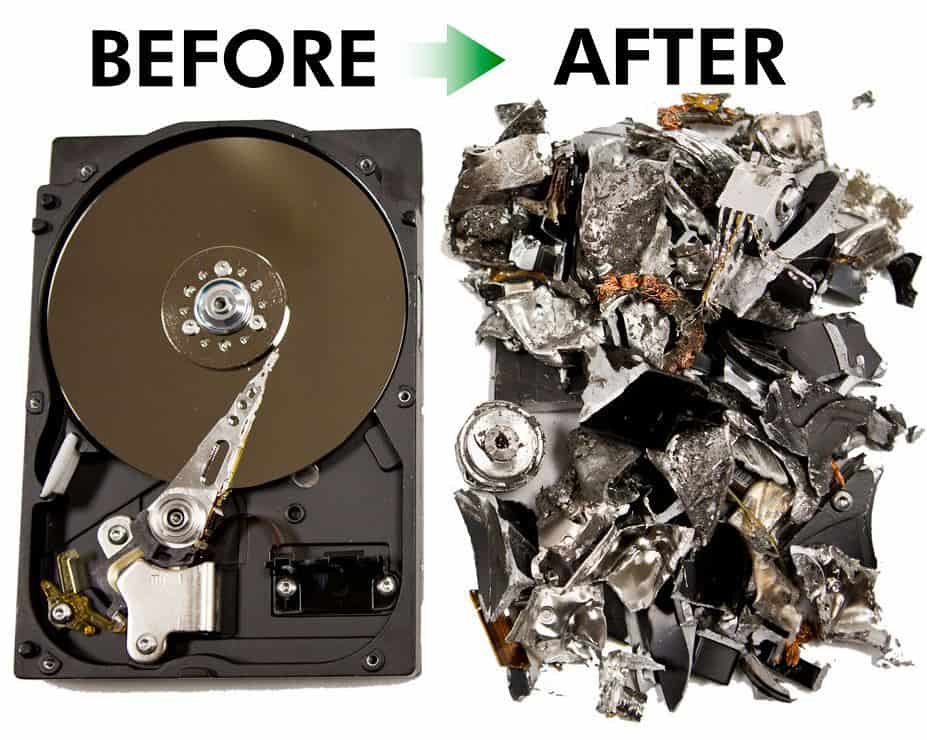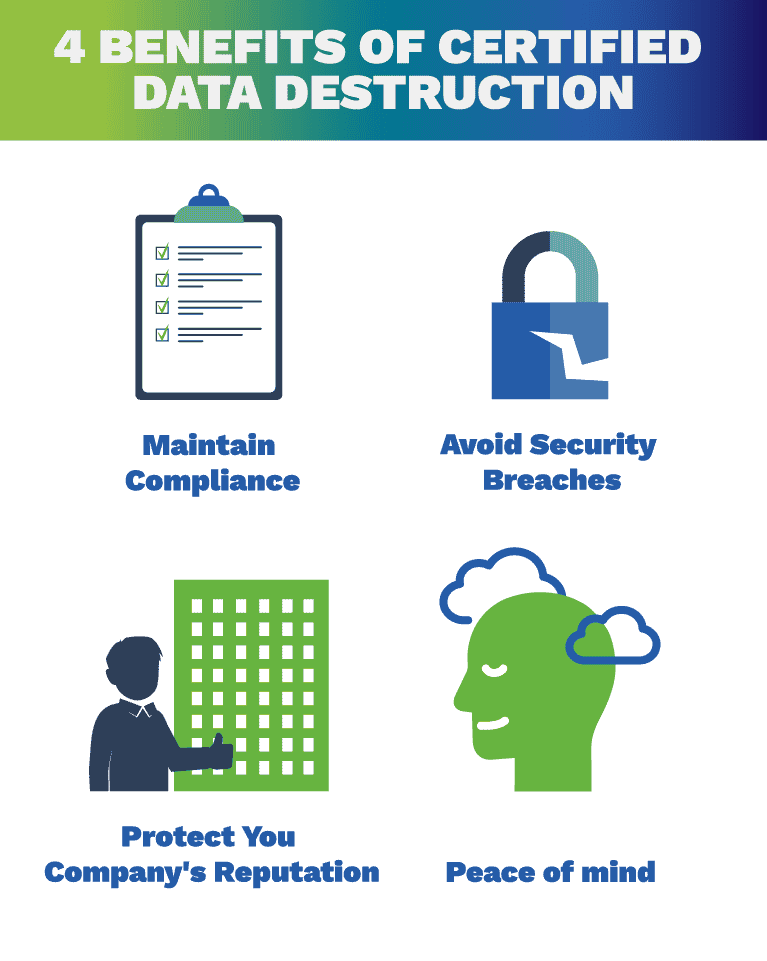Just How Proper Information Damage Contributes to Robust Computer System Protection Services and Mitigates Threats of Data Violations
In today's digital landscape, the importance of proper information devastation can not be overstated, as it works as an essential part of extensive computer security services. By implementing reliable information erasure strategies, organizations not just protect delicate info from unauthorized accessibility however also bolster their conformity with regulatory structures - data destruction. Nonetheless, the effects of poor data damage extend beyond simple compliance; they can profoundly influence an organization's cybersecurity stance and reputation. Recognizing these dimensions raises important inquiries regarding the methods in position and their performance in a period of rising cyber risks.
Value of Information Devastation
In today's electronic landscape, the significance of data destruction can not be overstated. As companies increasingly count on digital possessions, the possible risks connected with information violations and unapproved gain access to magnify. Effective data damage is an important element of a thorough details security strategy, safeguarding sensitive info from coming under the hands of destructive actors.
When data is no much longer needed, merely deleting documents or formatting disk drives is not enough. Residual information can usually be recovered making use of readily available devices, presenting significant hazards to both organizations and individuals. This underscores the requirement for robust information destruction practices that ensure all information is irretrievably eliminated.
In addition, governing conformity requireds, such as GDPR and HIPAA, emphasize the commitment to secure sensitive data, including its appropriate disposal. Non-compliance can lead to extreme financial charges and lawful consequences. data destruction. Hence, integrating effective information damage protocols not only improves safety and security but likewise fortifies an organization's track record and credibility

Methods of Secure Information Erasure
Several effective techniques of safe and secure information erasure can be used to guarantee that delicate details is completely gotten rid of from storage gadgets. One widely acknowledged strategy is data overwriting, which involves replacing existing data with random patterns multiple times. This approach dramatically decreases the possibilities of information recuperation, although it might not be efficient against innovative forensic techniques.

Physical devastation is likewise a trustworthy method, where storage space gadgets are rendered pointless through shredding, crushing, or incineration. This method guarantees that data can not be recouped by any kind of means however calls for mindful handling of hazardous products.
Lastly, specialized software tools developed for safe and secure data erasure supply functionalities that adhere to numerous erasure standards. These tools usually include features like confirmation processes to verify effective information devastation.
Utilizing these methods in combination can improve data safety and reduce the dangers related to data violations, ensuring that delicate information is not unintentionally exposed.
Legal and Compliance Considerations
The methods employed for secure information erasure not only offer to secure sensitive information however also should align with legal and conformity structures controling data protection. Organizations are needed to follow various policies, such as the General Information Security Guideline (GDPR), the Health Insurance Coverage Portability and Liability Act (HIPAA), and the Payment Card Industry Data Safety And Security Criterion (PCI DSS) These regulations mandate details procedures for data taking care of and devastation, guaranteeing that delicate and personal information is irretrievably erased when no more required.
Failing to abide by these lawful demands can lead to substantial fines, including penalties and reputational damage. Additionally, organizations must maintain documents of data devastation processes, demonstrating compliance during audits or investigations. This paperwork not just safeguards versus legal effects but also reinforces depend on with stakeholders and clients, showcasing a commitment to information safety and security.
Including legal and compliance factors to consider right into data devastation techniques is necessary for any kind of organization. It decreases the risk of information violations and highlights an aggressive technique to protecting delicate details, ultimately promoting a culture of safety and responsibility across the organization.
Impact on Cybersecurity Pose
Reliable data destruction dramatically improves a company's cybersecurity position by minimizing the prospective strike surface area for cyber threats. When delicate data is not effectively ruined, it continues to be easily accessible to harmful actors that can manipulate this info for unauthorized access, identity theft, or business reconnaissance. By implementing robust data devastation procedures, organizations can properly minimize the danger of data violations and improve their general safety framework.
Moreover, the secure disposal of outdated or unneeded data not only protects delicate info however additionally aids companies adhere to sector laws and standards. Failure to properly damage data can bring about severe legal repercussions and reputational damage, additional endangering a company's cybersecurity position.

Eventually, prioritizing effective information devastation is important for promoting a durable cybersecurity position, guaranteeing that companies stay watchful versus advancing cyber hazards while shielding their essential assets and stakeholders.
Best Practices for Organizations
Applying best methods for data damage is critical for organizations intending to protect sensitive info and alleviate cybersecurity threats. Organizations should establish a detailed information damage plan that describes procedures and duties. This policy ought to adhere to pertinent policies, such as GDPR or HIPAA, guaranteeing legal consistency.
Secondly, it is vital to make use of accepted information sanitization methods, consisting of information cleaning, degaussing, and physical devastation, customized to the type of data and storage space tool. Employing qualified experts for data destruction services enhances the integrity of these techniques.
Additionally, organizations should preserve an in-depth supply of all information storage space gadgets, ensuring that all obsolete or replaced devices undertakes devastation. Normal audits of information destruction practices can aid recognize weak points and enhance compliance.
Worker training is one more important element, as staff has to comprehend the value of data destruction and stick to established protocols. Ultimately, companies must directory document all information damage activities to provide liability and traceability, which can be very useful throughout audits or in case of a violation.
Verdict

One extensively identified approach is data overwriting, which entails replacing existing data with random patterns multiple times.The techniques employed for safe data erasure not just serve to protect sensitive information yet also has to line up with legal and compliance structures controling information defense. These laws mandate details protocols for data dealing with and damage, making certain that delicate and individual information is irretrievably gotten rid of when no longer required.
By applying durable data damage procedures, companies can successfully decrease the risk of data violations and boost their overall safety framework.
In conclusion, proper data destruction is crucial for enhancing computer system safety and security solutions and reducing the dangers linked with information violations. - data destruction
Comments on “The Influence of Effective Data Destruction on Cyber Security Risk Management”